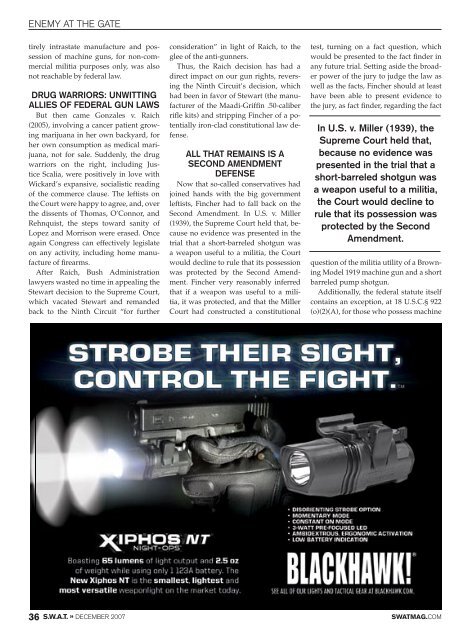S.W.A.T. December 2007 - McKeesport Police Department
S.W.A.T. December 2007 - McKeesport Police Department
S.W.A.T. December 2007 - McKeesport Police Department
Create successful ePaper yourself
Turn your PDF publications into a flip-book with our unique Google optimized e-Paper software.
ENEMY AT THE GATE<br />
tirely intrastate manufacture and possession<br />
of machine guns, for non-commercial<br />
militia purposes only, was also<br />
not reachable by federal law.<br />
DRUG WARRIORS: UNWITTING<br />
ALLIES OF FEDERAL GUN LAWS<br />
But then came Gonzales v. Raich<br />
(2005), involving a cancer patient growing<br />
marijuana in her own backyard, for<br />
her own consumption as medical marijuana,<br />
not for sale. Suddenly, the drug<br />
warriors on the right, including Justice<br />
Scalia, were positively in love with<br />
Wickard’s expansive, socialistic reading<br />
of the commerce clause. The leftists on<br />
the Court were happy to agree, and, over<br />
the dissents of Thomas, O’Connor, and<br />
Rehnquist, the steps toward sanity of<br />
Lopez and Morrison were erased. Once<br />
again Congress can effectively legislate<br />
on any activity, including home manufacture<br />
of firearms.<br />
After Raich, Bush Administration<br />
lawyers wasted no time in appealing the<br />
Stewart decision to the Supreme Court,<br />
which vacated Stewart and remanded<br />
back to the Ninth Circuit “for further<br />
consideration” in light of Raich, to the<br />
glee of the anti-gunners.<br />
Thus, the Raich decision has had a<br />
direct impact on our gun rights, reversing<br />
the Ninth Circuit’s decision, which<br />
had been in favor of Stewart (the manufacturer<br />
of the Maadi-Griffin .50-caliber<br />
rifle kits) and stripping Fincher of a potentially<br />
iron-clad constitutional law defense.<br />
ALL THAT REMAINS IS A<br />
SECOND AMENDMENT<br />
DEFENSE<br />
Now that so-called conservatives had<br />
joined hands with the big government<br />
leftists, Fincher had to fall back on the<br />
Second Amendment. In U.S. v. Miller<br />
(1939), the Supreme Court held that, because<br />
no evidence was presented in the<br />
trial that a short-barreled shotgun was<br />
a weapon useful to a militia, the Court<br />
would decline to rule that its possession<br />
was protected by the Second Amendment.<br />
Fincher very reasonably inferred<br />
that if a weapon was useful to a militia,<br />
it was protected, and that the Miller<br />
Court had constructed a constitutional<br />
test, turning on a fact question, which<br />
would be presented to the fact finder in<br />
any future trial. Setting aside the broader<br />
power of the jury to judge the law as<br />
well as the facts, Fincher should at least<br />
have been able to present evidence to<br />
the jury, as fact finder, regarding the fact<br />
In U.S. v. Miller (1939), the<br />
Supreme Court held that,<br />
because no evidence was<br />
presented in the trial that a<br />
short-barreled shotgun was<br />
a weapon useful to a militia,<br />
the Court would decline to<br />
rule that its possession was<br />
protected by the Second<br />
Amendment.<br />
question of the militia utility of a Browning<br />
Model 1919 machine gun and a short<br />
barreled pump shotgun.<br />
Additionally, the federal statute itself<br />
contains an exception, at 18 U.S.C.§ 922<br />
(o)(2)(A), for those who possess machine<br />
36 S.W.A.T. » DECEMBER <strong>2007</strong> SWATMAG.COM


